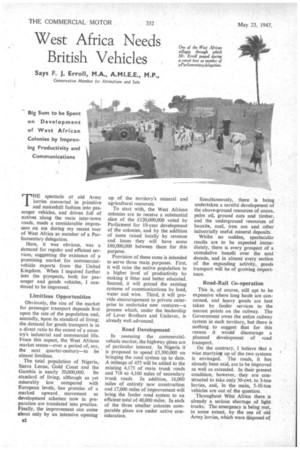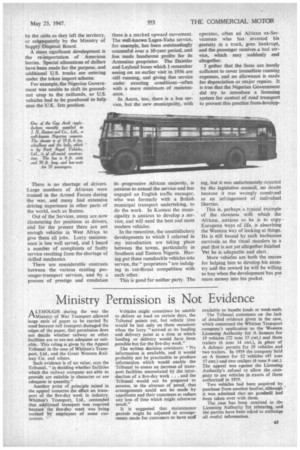West Africa Needs British Vehicles
Page 36

Page 37

If you've noticed an error in this article please click here to report it so we can fix it.
Says F. J. Erroll, M.A., A.MI.E.E., M.P., Conservative Member for Altrinch am and Sale THE spectacle ot old Army lorries converted in primitive and makeshift fashion into passenger vehicles, and driven full of natives along the main inter-town roads, made a considerable impression on me during my recent tour of West Africa as member of a Parliamentary delegation.
Here, it was obvious, was a demand for regular and efficient services, suggesting the existence of a promising market for 'commercialvehicle exports from the United Kingdom. When I inquired further into the prospects, both for passenger and goods vehicles, I continued to be impressed.
Limitless Opportunities
Obviously, the size of the market for passenger transport depends first upon the size of the population and, secondly, noon its standard of living; the demand for goods transport is in a direct ratio to the extent of a country's industrial and commercial life. From this aspect, the West African market seems—over a period of, say, the next quarter-century—to be almost limitless.
The total population of Nigeria, Sierra Leone, Gold Coast and the Gambia is nearly 30,000,000. Its standard of living, although as yet miserably low compared with European levels, has promise of a marked upward movement as development schemes now in preparation are translated into practice. Finally, the improvement can come about only by an intensive opening up of the territory's mineral and agricultural resources.
To start with, the West African colonies are to receive a substantial slice of the £120,000,000 voted by Parliament for 10-year development of the colonies, and by the addition of sums raised locally by revenue and loans they will have some £80,000,000 between them for this purpose.
Provision of these sums is intended to serve three main purposes. First, it will raise the native population to a higher level of productivity by making it fitter and better educated. Second, it will extend the existing systems of communications by land, water and wire. Third, it will provide encouragement to private enterprise to undertake new, ventures—a process which, under the leadership of Lever Brothers and Unilever, is already well advanced.
Road Development
In assessing the commercialvehicle market, the highway plans are of particular interest. In Nigeria it is proposed to spend £5,300,000 on bringing the road system up to date. A mileage of 455 will be added to the existing 4,175 of main trunk roads and 718 to 4,100 miles of secondary trunk roads. In addition, 16,000 miles of entirely new construction and 17,000 miles of improvement will bring the feeder road system to an efficient total of 40,000 miles. In each of the three smaller colonies comparable plans are under active consideration. Simultaneously, there is being undertaken a careful development of the above-ground resources of cocoa, palm oil, ground nuts and timber, and the underground resources of bauxite, coal, iron ore and other industrially useful mineral deposits.
Whilst no sudden, spectacular results are to be expected immediately, there is every prospect of a cumulative benefit over the next decade, and in almost every section of the expanding activity, goods transport will be of growing importance.
Road-Rail Co-operation
This is, of course, still apt to be expensive where long hauls are concerned, and heavy goods are best taken by feeder services to the nearest points on the railway. The Government owns the entire railway system in each territory, but there is nothing to suggest that for this reason it would discourage a planned development of road transport.
On the contrary, I believe that a wise marrying up of the two systems is envisaged. The roads, it has already been said, are to be improved as well as extended. In their present condition, however, they are constructed to take only 30-cwt. to 3-ton lorries, and, in the main, 5-10-ton• vehicles are out of the question.
Throughout West Africa there is already a serious shortage of light trucks. The emergency is being met, to some extent, by the use of old Army lorries, which were disposed of
by the units as they left the territory, or subsequently by the Ministry of Supply Disposal Board.
A more significant development is the re-importation of American lorries. Special allocations of dollars have been made for the purpose, and additional U.S. trucks are entering under the token import scheme.
For example, the Nigerian Government was unable to shift its groundnut crop to the railheads, so U.S. vehicles had to be purchased to help ease the U.K. fats position.
There is no shortage of drivers. Large numbers of Africans were trained in the Armed Forces during the war, and many had extensive driving experience in other parts of the world, such as Burma.
Out of the Services, many are now clamouring for positions as drivers, and for the present there are not enough vehicles in West Africa to give them all jobs. Lorry maintenance is less well served, and I heard a number of complaints of faulty service resulting from the shortage of skilled mechanics.
There are considerable contrasts between the various existing passenger-transport services, and by a process of prestige and emulation there is a marked upward movement. The well-known Lagos-Yaba service, for example, has been outstandingly successful over a 10-year period, and has made handsome profits for its Armenian proprietor. The Daimler and Leyland buses which I remember seeing on an earlier visit in 1936 are still running, and giving fine service under exacting conditions—often with a mere minimum of maintenance.
In Accra, too, there is a bus service, but the new municipality, with its progressive African majority, is anxious to extend the service and has engaged an English traffic manager, who was formerly with a British municipal transport undertaking, to do the work. In Kumasi the municipality is anxious to develop a service, and will need the best and most modern vehicles.
In the meantime, the unsatisfactory developments to which I referred in my introduction are taking place between the towns, particularly in Southern and Eastern Nigeria. Having put these ramshackle vehicles into service, the " proprietors "are indulging in cut-throat competition with each other.
This is good for neither party. The operator, often an African ex-Serviceman who has invested his gratuity in a truck, goes bankrupt, and the passenger receives ,a bad service, which may suddenly end altogether.
I gather that the fares are barely sufficient to cover immediate running expenses, and no allowance is made for depreciation or major repairs. It is true that the Nigerian Government did try to introduce a licensing system for control of road transport to prevent this practice from develop
ing, but it was unfortunately rejected by the legislative council, no doubt because it was wrongly construed as an infringement of individual liberties.
This is, perhaps a typical example of the slowness with which the African, anxious as he is to copyEuropean ways of life, is absorbing the Western way of looking at things. He is still bound by such barbarous survivals as the ritual murders to a past that is not yet altogether finished Iht he is adaptable and alert.
More vehicles are both the means for helping him to develop his country and the reward he will be willing to buy when the development has put more money into his pocket.












































































